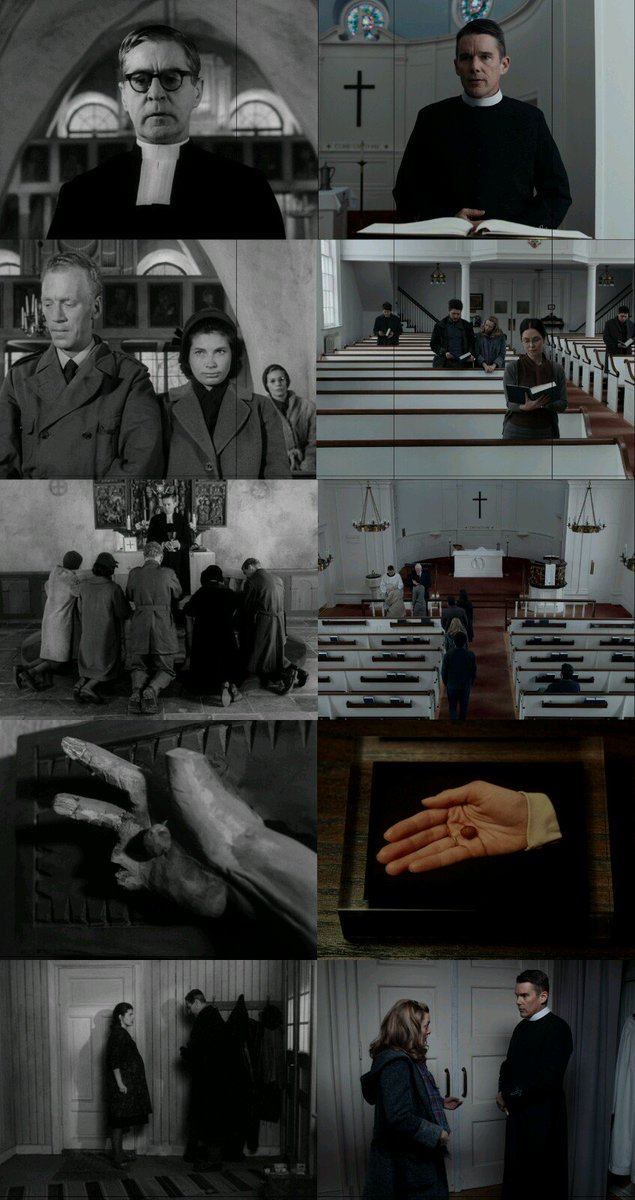Ingmar Bergman’s 1963 classic, Winter Light, is one of my favorite films of all time and is easily one of the most important to me. This is a difficult movie to describe in words, and I think anyone who has seen it will understand why. Ingmar Bergman nearly always placed feelings and tone over plot so I will do my best to describe how this film makes me feel. As someone who has struggled with faith and its implications, I found the film’s treatment of certain subjects like the presence of God in an evil world and the failure of the film’s protagonist to be the shepherd he so desperately longs to be, so touching and honest that somehow in even its most bleakest moments, I found a lot more hope in it than I had anticipated.
The film:
Before I talk about this movie more in depth, I think it would be necessary to explain some context. Winter Light is the middle part of a trilogy, commonly called the “Faith Trilogy” or the “Silence of God Trilogy” or sometimes even just the “Bergman Trilogy.” As you might be able to guess, each film deals with uncertainty with the existence of God. The first film in the series, Through A Glass Darkly, deals with the idea of a literal God being illusory and instead equates God with feelings, such as love. Winter Light deals with the breakdown of a pastor’s faith as he fails to be there for his parishioners. The final film, The Silence, has pretty much nothing to do with God or religion. And that is the point. The Silence depicts a world where there is no God, whereas the previous two films are preoccupied with the notion of God.
This film is most definitely a drama, but I feel like it falls under some category that we could call a "psychological drama." This movie is about a crisis of mind and emotions. It is the very same genre that one could place First Reformed (which is extremely inspired by Winter Light to the point of being a soft remake) and Scorsese's 2016 masterpiece Silence, which is thematically the same just in a different context of suffering.

Probably the most powerful allusion this film uses, at least to me, is that of the main character. His name is Tomas, which is an obvious parallel to the apostle Thomas in the New Testament. Just like his namesake, Tomas in Winter Light struggles with serious doubt about God’s existence, and even questions whether or not it would be better if God never existed at all. At that point life could be explained as merely the result of a chemical reaction, evil wouldn’t seem so foreboding and mysterious in an impartial universe, and death would be a simple “snuffing out” of life. No complication, no suffering, and ensured peace.
That may seem depressing and nihilistic on the surface level, but I find it encouraging because I have always found the story of “Doubting Thomas” to be powerful. For those unfamiliar, the episode is recorded in the Gospel of John, during the 20th chapter. After Jesus’ resurrection, Thomas refuses to believe that the man before him is really the risen Christ and it takes his tactile investigation of Jesus’ stigmata to finally believe in the resurrection. This prompts Jesus to respond with one of his immortal quotes “Blessed are those who have not seen, yet believed.” I always considered this to be encouraging in spite of my own doubt because for all intents and purposes St. Thomas really should have had a leg up as far as faith goes. After all, he interacted with Jesus in the flesh and witnessed key Biblical moments in real time with his own eyes. Yet, even after everything he had seen Jesus do, he was still skeptical of his resurrection. The fact that anyone can have even the smallest faith two thousand years after all of this happened, is incredible. Of course, this theme is solidified in a monologue towards the end when Tomas has a conversation with the sexton. The sexton, who has been through tremendous physical suffering, holds the opinion that the focus on Jesus’ physical torment on the cross takes too much of the focus. He argues that the pain of the crucifixion was hardly the worst pain Jesus felt, in fact it was really brief in comparison. He argues that throughout the Gospel account, the apostles continuously misunderstood Jesus’ teachings. They simply did not understand. And when, after the Last Supper, Caiaphas came to arrest Jesus, his apostles deserted him and Peter denied having known him. Being misunderstood and alone, he argues would have been a painful experience. After all, the apostles had been with him for three years. And during his crucifixion, he cried out to God “why have you forsaken me?” The sexton argues that Jesus, in his suffering, momentarily thought that even his heavenly Father had abandoned him. Momentarily, he thought that everything he preached was a lie. He experienced doubt. That, the sexton argues, was the most painful of all. Enduring the silence of God.
No comments:
Post a Comment